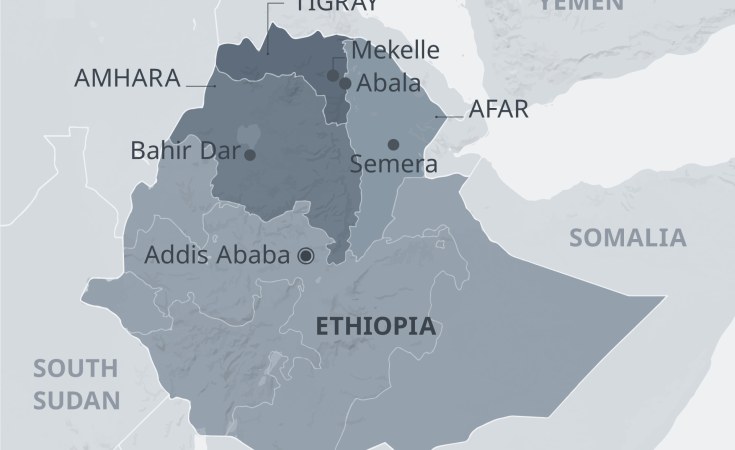Addis Abeba — Death toll from what is suspected to be a drone attack in Finote Selam town, East Gojam Zone of Amhara region, has reached at least 30, with more than 55 others injured in the attack currently receiving treatments at the town's main hospital.
Head of the Finote Selam General hospital Manaye Tenaw told Addis Standard that the majority of the deceased 30 were already dead upon arrival, with only two succumbing to their injuries after being admitted. Reports put the death toll as high as 70 citing deaths that have not been reported to the hospital.
The hospital head clarified that the attack took place on Sunday, 13 August, outside a hotel called Damot in the town. "We heard the explosion early in the morning, and soon after, numerous victims started arriving at our facility around 12pm" he conveyed, adding that "all the victims were male, with most in their 20s, save for one 15-year-old boy."
An anonymous local resident informed Addis Standard that the attack occurred at 10am in the morning. According to him, the victims were reportedly preparing to travel to the Mankusa area by a heavy vehicle due to a lack of other transportation means. This individual also revealed that both those inside the vehicle and in its vicinity were affected by the attack.
The same resident, while speculating on the cause of the attack, mentioned, "though it seems like a drone might have been the primary instrument, there's also the possibility of it being a shelling by other heavy weaponry, perhaps a bomb."
A second resident, who surveyed the scene after the attack, told Addis Standard, that "though emergency responders had cleared both the deceased and the injured by my arrival, the ground bore witness with blood, and signs of the explosion were evident everywhere." This individual also noted observable damages to a building adjacent to Damot Hotel, particularly shattered windows.
Highlighting the challenges in the aftermath of the attack, Manaye Tenaw, the head of Finote Selam Hospital mentioned a pressing shortage of medical supplies and oxygen, a consequence of an ongoing transportation blockade that has spanned nearly two weeks.
"Our primary sources for oxygen are Debrebrhan and Bahirdar. With the transportation avenues blocked, we are witnessing fatalities due to the unavailability of oxygen," he expressed.
The hospital's head strongly appealed to the relevant authorities, urging prompt action to restore transportation and ensure a steady flow of essential medical supplies to prevent further death of victims currently receiving treatments at the hospital.
On Monday, the Ethiopian Human Rights Commission (EHRC) issued a statement revealing that it has received multiple complaints related to human rights violations in connection with the ongoing conflict in Amhara region including numerous arrests of individuals of Amhara ethnicity, and stated that it has been denied access to monitor the conditions of detainees since the State of Emergency was declared.
According to the EHRC's statement, there have been credible reports of strikes and shelling in various areas, including Debre Birhan, Finote Selam, and Burie, resulting in civilian casualties and damage to residential areas and public spaces. In the capital Bahir Dar, the commission said, civilians have been killed on the streets or outside their homes, and some individuals have been specifically targeted for searches, beatings, and killings.
The House of People's Representatives (HoPR) approved on Monday, the State of Emergency declaration issued last week by the Council of Ministers (CoM) in connection with the militarized conflict in Amhara regional state with 16 members of parliament opposing the decree, while 12 members abstained from voting.
Notable opposition came from the former president of the Amhara region who was also Foreign minister and the PM's national security adviser, Gedu Andargachew. Gedu described the state of emergency decree as an attempt to solve political problems with military might which he said has been repeatedly tried before across the country but to no avail.
According to Gedu, the current conflict in the Amhara region emanates from "political leadership failure of the Prosperity led government". He said "the relations of the Amhara people and that of the Prosperity Party have become untenable", and thus, called for the establishment of "all Amhara forces inclusive administration".
The Command Post established to oversee the six-months state of emergency in Amhara region said "innocent lives" have been lost, properties destroyed and looted in the ongoing conflict in the region, adding that the damage will be investigated and made public.
The Command Post said in a statement on Friday last week that it has successfully finalized the first phase of its operation which was "to liberate" the cities and towns that were held by the Fano armed group and restore peace and order in the region, after days of intense fighting between the non-state local armed group Fano and government forces that has led to the imposition of curfews in major cities and towns. AS


